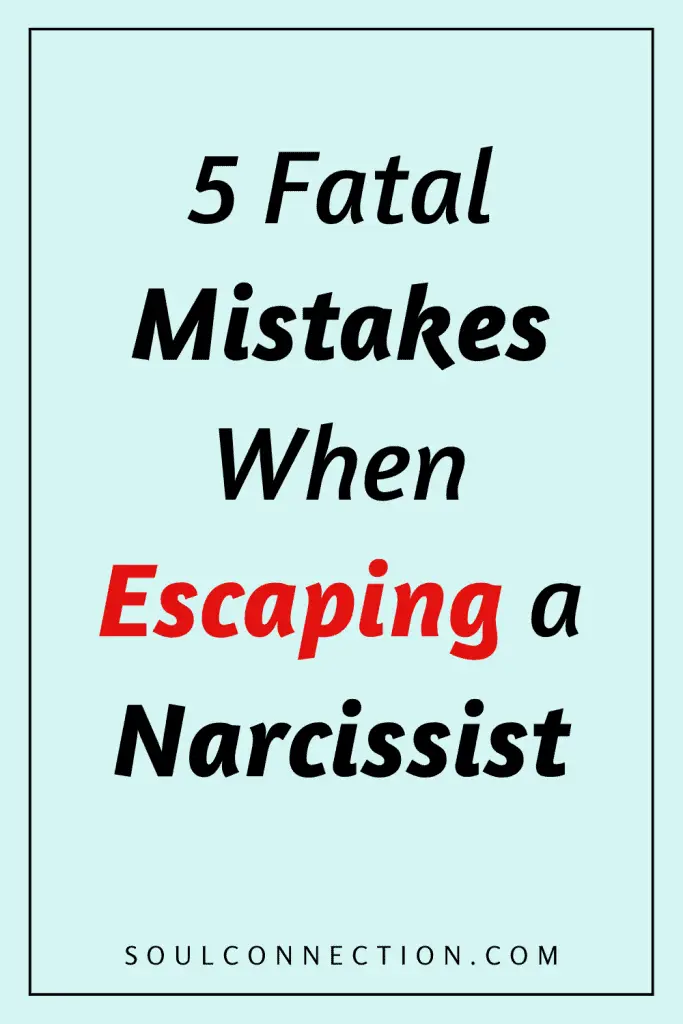Saying goodbye to a narcissist is a bit like wrestling a greased pig that’s read Machiavelli. It’s never straightforward, rarely graceful, and there’s probably going to be some squealing.
If you’ve ever fantasized about a dramatic exit set to swelling music (shout out to every movie ever), real life tends to serve up a messier, slipperier affair.
Before making your break, watch out for these five catastrophic missteps that can turn a hard situation into a complete emotional trainwreck.
1. Announcing Your Exit Like It’s a Surprise Party
Ever heard the phrase “don’t poke the bear”? Well, telling a narcissist you’re leaving before you’re actually gone is more like poking a bear, then waiting for it to wake up, stretch, and swipe your head off.
Narcissists thrive on control. Handing them an early warning is basically an invitation for them to crank up all their nastiest tricks. The love-bombing returns! The gaslighting intensifies!
Suddenly, your bank account starts looking light, your friends stop texting, and your passwords don’t work. Funny how that happens.
If you must communicate, keep it minimal, vague, and as close to your exit date as possible. Secure your finances, passwords, important documents, and—if needed—a safe place to go.
Think more ninja, less wedding crasher. There’s no medal for announcing your plans ahead of time, and the only surprise you want is how peaceful it feels when you’re finally out.
2. Underestimating the Narcissist’s Houdini-Level Manipulation
Narcissists are the Olympic gymnasts of emotional manipulation. They can twist, contort, and bend reality in ways you didn’t think possible. “Maybe I am the crazy one?” you’ll wonder. Spoiler: you’re not.
One of the biggest mistakes is believing you’ll reason your way out. Maybe you hope they’ll finally see your side, or acknowledge your pain with a single, heartfelt tear. (And if you believe that, I’ve got a bridge to sell you.)
The narcissist’s response will range from crocodile tears to rage storms, all designed to reel you back in or punish you for daring to leave.
Prepare for this by setting clear, non-negotiable boundaries. Do not get pulled into circular arguments, guilt trips, or promises of change. Make your plan, stick to the facts, and refuse to engage in emotional wrestling matches.
Keep conversations short, practical, and focused on logistics. If all else fails, “I’m not discussing that” works wonders.
3. Falling for the Hoovering Trap
Ah, the hoover. Named after the vacuum, this is when the narcissist sucks you back in with apologies, nostalgia, or declarations of undying love.
Suddenly, all the good times are highlighted (with convenient amnesia about the bad ones), and you’re left wondering if you imagined the whole “toxic relationship” thing.
Don’t fall for it. The hoovering phase is narcissistic PR at its finest: love notes, promises of therapy, teary confessions, even gifts (if they’re feeling especially theatrical).
Spoiler alert: the cycle will repeat.
Save yourself some sanity and put the phone down. Block numbers, mute social media, and resist the urge to “just check in.”
Think of hoovering as the relationship equivalent of expired milk: looks fine on the outside, but give it a sniff and you’ll gag.
4. Expecting Mutual Friends to Pick Sides (Yours)
When you’re in the thick of it, it’s tempting to believe that anyone who sees the truth will instantly line up behind you, waving flags and chanting your name.
Reality check: narcissists are world-class storytellers, spinning tales that paint them as the wounded hero and you as the villain with a chainsaw.
Mutual friends—even family—might be taken in by the act. Some will stay neutral out of discomfort, others will believe the narcissist’s sob stories, and a few brave souls will back you up.
It’s a mixed bag, and there’s often a side of disappointment.
Prepare for some people to drift away. Focus your energy on those who’ve proven trustworthy. Keep your explanations simple: “It wasn’t healthy for me.”
The emotional circus is exhausting enough without selling tickets to your break-up drama.
5. Neglecting the Aftermath (And Your Own Sanity)
Once the dust settles, it’s easy to think, “Done and dusted! Onward!” But the post-narcissist hangover is real. Self-doubt, anxiety, guilt—it all comes tumbling in, often when you least expect it.
Many survivors try to soldier on without rest or support, convinced they should be fine now. Newsflash: Narcissistic relationships are a marathon through emotional quicksand.
Recovery isn’t about gritting your teeth and pretending you’re unscathed. It means giving yourself permission to seek therapy, lean on your support system, and—yes—block your ex’s number for the thousandth time.
Look after yourself. Build routines that keep you grounded, and don’t underestimate the power of sleep, food, and a phone call to a friend who gets it. Healing isn’t linear.
Some days you’ll feel like you can conquer the world; other days, you’ll want to shout into a pillow. Both are normal, and neither means you made a mistake by leaving.
Freedom Actually Looks Like This
Escaping a narcissist is never as easy as it looks in those made-for-TV movies. There’s no slow-motion montage, no background music swelling as the sun rises on your new life.
But there’s a quieter, profound kind of freedom waiting on the other side—a kind that’s built on boundaries, self-respect, and the radical act of putting your own needs first.
Take it one step at a time. Ignore the temptation to narrate your every move or to out-drama the drama.
The best revenge, as they say, is living well—and maybe, just maybe, getting a little peace and quiet for once.
Because in the end, you’re not running away from something. You’re running toward yourself.
And honestly, that’s the only happy ending that matters.


